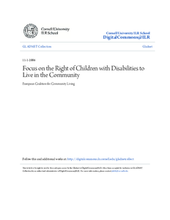ECCL considers that institutions have no place in modern European societies. They strongly oppose the notion that some children will always need institutional care. While many children with disabilities will need a range of professional support services throughout their lives, ECCL believes there is no justification for providing such services in an isolated or segregated environment, whatever the nature of the child’s disability. All of the services they need can be provided in the family home, foster care or small community homes.
If governments introduce a policy of maintaining institutions for those children considered to have ‘severe and profound’ disabilities, they will create environments which do little more than “warehouse” such children. Children living in these institutions do not receive an acceptable level of care, support or education. Often they are abandoned because their parents are encouraged to forget about their existence. Those families who do want to maintain contact find it difficult to do so because many institutions are situated in rural areas with limited access by public transport. The children in such institutions have little or no opportunity to experience contact, let alone friendship with non-disabled peers. Nor are they enabled to make decisions for themselves, which is crucial to the development of every child.
Numerous studies show that the institutionalisation of disabled children leads to serious delays and impairments in their personal development. Thus those children who have been institutionalised will have more difficulties in participating in society than their peers who have received the support that they need while living in the community with either natural or foster families.
People with disabilities face widespread stigma and discrimination. The segregation of disabled people compounds the ignorance, fear and prejudice of non-disabled people towards disabled people. Only by ending the institutionalisation of all disabled children and adults and promoting their social inclusion will it be possible to overcome such negative attitudes. By enabling disabled and non-disabled children to play together, go to school together and grow up together, they will learn and accept that it is normal to be different.
For these reasons, ECCL considers that action must be taken to close all institutions for disabled children in Europe and develop an appropriate range of alternative community-based services as alternatives to institutional care. Any investment in institutional care for disabled children will perpetuate the situation and hinder the development of quality community-based services for them. Thus policies and resources must be focused on the planning and provision of community-based services which are responsive to the needs of disabled children and adults.
©European Coalition for Community Living

